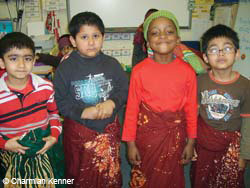Supporting bilingual children
Add to My Folder
More and more children are coming into early years settings being able to speak two languages. Charmian Kenner explains why it is so important to encourage different languages in your setting

Children in a nursery class in Tower Hamlets, East London, were learning about jobs in Bangladesh. Many of the children were of Bangladeshi origin, and they were studying this topic in both English and Bengali as part of a research project on bilingualism. Support came from their Bengali-speaking teacher and a visitor – an after-school Bengali teacher from a nearby mosque. Neither adult could remember the word for ‘fisherman’ in Bengali, so they gave the children the word for ‘fishing’ instead. At the end of the session, one four-year-old went up to the teacher and said that the word wasn’t right because it meant ‘fish-catching’ not ‘fisherman’. The teacher then remembered the word for ‘fisherman’ and the little boy went away satisfied.
What does this example show us about young children’s bilingual abilities? It shows us that this child was thinking about his ideas in both languages. He knew the difference between Bengali and English and was not confused by having two languages. By comparing his languages he worked out that ‘fishing’ and ‘fisherman’ were different types of word – one was an activity and the other was a person.
These are typical findings regarding bilingual children. Bilingualism is a huge advantage because it increases children’s understanding about how language works. They become more flexible thinkers and can use both their languages to support their learning.
Why is it important to support bilingualism in the early years?
Practitioners in early years settings play a key role in making sure that children keep their skills in mother tongue, as well as adding English. If parents and children know that you value their languages for learning, they will be motivated to continue with them. Children who maintain their first language will stay connected to home and family, so that they feel secure in their identity and have more self-confidence. This helps them to achieve well at school.
You will be helping children’s wider lives and future prospects, too. Bilingual children can communicate with more people in their community and internationally, and understand different cultures. They can learn other languages more easily and have more job opportunities in the future.
Key points
Already a member? Sign in below.
Published 9 November 2009
Reviews
You need to be signed in to place a review.

